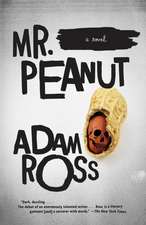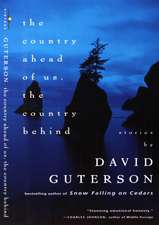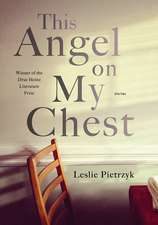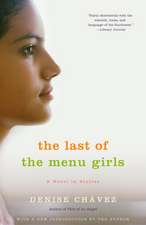Ladies and Gentlemen
Autor Adam Rossen Limba Engleză Paperback – 6 aug 2012
A hotshot lawyer, burdened by years of guilt and resentment, comes to the rescue of his irresponsible, irresistible younger brother. An unsettling story resonates between the dysfunctional couple telling it and their listening friends as well. A lonely professor, frequently regaled with unbelievably entertaining tales by the office handyman, suddenly fears he’s being asked to abet a murderous fugitive. An awkward but nervy adolescent uses his brief career as a child actor to further his designs on a WASPy friend’s seemingly untouchable sister. A man down on his luck closes in on a mysterious, much-needed job offer while doing a good turn for his fragile neighbor, with results at once surreal and hilarious. And when two college kids goad each other on in an escalating series of breathtaking dares, the outcome is as tragic as it is ambiguous.
Laced with glimmers of redemption, youthful energy, and hard-won wisdom, these noirish stories unspool purposefully and fluidly; together they confirm the arrival of—as Michiko Kakutani put it in The New York Times—“an enormously talented writer.”
Preț: 114.42 lei
Nou
Puncte Express: 172
Preț estimativ în valută:
21.90€ • 23.78$ • 18.39£
21.90€ • 23.78$ • 18.39£
Carte disponibilă
Livrare economică 01-15 aprilie
Preluare comenzi: 021 569.72.76
Specificații
ISBN-13: 9780307454911
ISBN-10: 0307454916
Pagini: 243
Dimensiuni: 132 x 201 x 20 mm
Greutate: 0.2 kg
Editura: VINTAGE BOOKS
ISBN-10: 0307454916
Pagini: 243
Dimensiuni: 132 x 201 x 20 mm
Greutate: 0.2 kg
Editura: VINTAGE BOOKS
Notă biografică
Adam Ross lives in Nashville, Tennessee, with his wife and their two daughters.
www.adam-ross.com
www.adam-ross.com
Extras
From Futures
Before the interview—in one of his two appropriate suits, this one a blue pinstripe—David Applelow, aged forty-three, passed the time forecasting: predicting first what his interviewer might look like, hoping for a beautiful woman, not merely attractive but uncommonly gorgeous, who would not only be so kind as to give him a job (that is, save his life) but also to offer herself as an immediate bonus, on the desk or the rug (if there was one) or the chair if it had no arms, her offer an act of the greatest generosity, because this kind of thing, however common to a man’s fantasy, never happened, particularly not to Applelow, and if it were to, he would be surprised for the first time in years.
And then he suddenly became self-critical. It was typical, cripplingly typical, Applelow thought, for his mind to wander just before an interview, like being unserious when just the opposite was called for. And so, after a stern, internal upbraiding, a pinch to the crease in his pants, and the discovery and timely plucking of black string sticking out from the heel of his loafer, he considered the questions he might be asked when he finally did step through that door. He hoped to forge an immediate connection with the woman; as on a good first date, they would get beyond the scripted questions and move gingerly toward something more personal, such as his opinions on how things really worked or insights gleaned from his stints as a professional. And then they’d hedge toward the future. She’d talk about the job as if it were his already, about benefits, profit sharing, and salary—a number exceeding even his most optimistic expectations—and thus the accident that had brought him to this office would reveal itself to have been fated.
His mind wandered again, and he felt disembodied, adrift. Ceiling high, he watched himself sitting there. Walk, he thought. A soda might give him the boost he needed, but he foresaw a devastating, mid interview belch. He was unbearably hungry. To take his mind off his appetites, he picked up the nearest magazine.
When Applelow had arrived earlier, two men were waiting in the reception area. One was younger, in his mid-twenties, underdressed in jeans and a golf shirt, with a résumé in his lap that appeared to be handwritten. He was a bundle of tics, pulling at his nose and snorting repeatedly, as if gathering up enough mucus to hawk it out. The second candidate, an enormous black man in a cheap gray suit, made a production of working on his laptop to pass the time—no easy trick, as his digits were so thick he had to type single-fingered—and then made several calls on his cell phone that Applelow was sure were fake. At one point, he turned to the receptionist, whose nameplate read Madeline, and said:
“Excuse me. A matter of protocol. I have two résumés, one with a more technical focus on my specialty and the other leaning toward more personal qualifications. Is there a particular aspect you’d prefer we stress?”
Which told Applelow that he had no competition in the room. Madeline, slowly swiveling around in her chair, replied, “Whichever you’d rather we see.” With a flourish, the man opened his briefcase and reviewed both résumés, then decided on one with a determined nod of the head. The younger man two chairs down from Applelow pumped his heel up and down so fiercely it shook the seat between them. Then he suddenly got up and left.
Applelow raised an eyebrow at Madeline.
“It’s not the first time,” she said.
Gray Suit was called into the office. A few minutes later he too was headed out.
It was a chance, Applelow thought, to get some information, because the ad for this job had been mysterious. A few days ago, while searching the classifieds, he’d spilled coffee on the newspaper, the liquid forking out and rejoining to cast one small section of the newsprint into dry relief. He was about to clean up his mess when the headline caught his eye.
THE FUTURE IS NOW
Are you perceptive, analytical, a troubleshooter? Have excellent interpersonal skills you were never sure how to parlay into $$$? Auratec is a fast-growing, highly selective West Coast company seeking applicants with ability in the abstract to help us start offices in the New York area. Will train qualified candidates. SALARY AND BENEFITS. 401(K). Growth potential unlimited. Fax résumé attention Laura Samuel. 556-1583.
“Have you seen a lot of people for the job already?” he asked Madeline.
She turned from her computer to give him her full attention. On the wall behind her a sign said Auratec, with an Egyptian ankh in place of the t. “Ms. Samuel has been seeing people constantly.”
Applelow waited, smiling.
“We’re always growing,” she continued.
“It’s a small office.”
“Our new one’s being renovated at the Time Warner building.”
“Ah,” Applelow said.
The phone burbled quietly, but she didn’t answer it.
“So is this a sales position?”
Madeline winced sweetly. “I’m afraid I can’t give out that information.”
Of course not, Applelow thought.
Earlier that afternoon, he’d withdrawn twenty-four hundred dollars from his bank account—every cent he had—in hundred-dollar bills. In his current financial straits, he felt the need to have the cash on hand, and there was something liberating about keeping all your assets on your person. He imagined it must be how a camel feels about its hump. Afterward, he walked down Fifth Avenue to the interview feeling strangely confident, among the lunch crowds and tourists. He played catch-her-eye with beautiful women and noted his reflection in shop windows, appearing to anyone concerned like someone who had a place in the world. This heady feeling carried him to the Rockefeller rink, where he stopped to watch the children skate, watched their parents watching them, and stared at the lovers holding hands. But then his mood darkened and he leaned against the railing, crushed with despair.
It was not uncommon for Applelow to be poor. He’d made real money during only a few brief stretches. His working life had been a hodgepodge of “professions”—a few years as a corporate speechwriter, as an assistant to a literary editor, as a set builder for a film-production company. Not every job he’d had was a dead end, but none had ever gelled into anything that could be called a career. He’d spent the last six years managing a small off-Broadway theater company called The Peanut Gallery, founded and funded by an actor named Jason Heywood Green, whose career in independent films, despite sterling reviews, had lately taken a dive. “I’m playing the heavy in the Mission Impossible sequel just to make my mortgage payments,” he’d told Applelow. “My accountant says I’ve got to trim some fat.” So, in the blink of an eye, the place where Applelow thought he’d spend the next decade of his professional life was shut down, and after his unemployment benefits ran out he burned through what little savings he had in a matter of months. The company had done three productions every year, and he’d handled everything from marketing and advertising to set building and accounting. There was almost nothing with which he hadn’t had some sort of experience, but his applications went unanswered and the terrible economy didn’t help. It was a world, he was realizing, divided between the specialized and the unspecialized, the job titles all the more convoluted the less specialized they were. Applelow was starting to fear that this recent turn of events was in fact the beginning of a slide into unrecoverable failure. You should have seen this coming, he thought.
Madeline’s intercom chimed. “Yes, Ms. Samuel?”
“If I don’t eat soon,” the voice said, “I’m going to kill somebody.”
Madeline looked at Applelow and shrugged her shoulders apologetically. She turned off the intercom, and picked up the handset. “Yes,” she said, lowering her voice. “No, he doesn’t.”
“I can wait,” Applelow whispered.
But the door was already opening.
“It’s an eclectic résumé,” Ms. Samuel said.
“That’s how I like to think of it,” Applelow answered.
To call Ms. Samuel gorgeous would have been a titanic understatement. She was one of the most beautiful women he had ever seen: young, blonde, twenty-eight at most, and positively tiny—maybe five foot two in heels—with owlish gray eyes. Everything in her office radiated a spare, modern seriousness, yet her demeanor was disarmingly warm. She listened to Applelow’s initial answers with a polished professionalism, but when their banter turned light, she punctuated it with musical little tee-hees.
“Feature film releasing?” she asked.
“B-picture distribution,” Applelow said. “This was to theaters in the Times Square area. Horrible stuff. Apache Ninja. Jailhouse Jane. This was a long time ago. Back in the late eighties.”
“It says here you were VP of the whole division.”
“Well, there was just the boss and me. We were the whole company. Consequently, I was VP of everything. VP of phone, VP of faxes. VP of copies.”
Ms. Samuel tee-heed. Snorted loudly.
He loved her.
“Canvassing coordinator,” she said. “Tell me about that.”
“It was a fund-raising campaign for toxic-cleanup legislation on Long Island. You’ll see I grossed more in donations that year than anyone else in my division. It was pure sales—one of the great think-on-your-feet jobs. Take information about an issue, then develop your own rap out of it. Leave a stranger’s door with money.”
Applelow was on the ball. He didn’t sell his good qualities too hard. Without sounding like a liability, he addressed weaknesses that could be transformed into strengths. When they talked about his tenure at the theater company he was so on point he would have hired himself. It was a waltz, Applelow thought, with Ms. Samuel leading, but it was also like dancing in a pitch-dark room. What was the job?
“Okay,” she said. “Let’s take this in another direction.” Ms. Samuel came around to the front of her desk and leaned against it. “Do you put much stock in astrology?”
“The science?”
Ms. Samuel started pacing. “Zodiac, stars, the whole thing. Do you believe it has any merit at all?”
This question gave him serious pause. Could she be a horoscope nut or a chart maker? What if astrology was her personal religion?
“I’m an Aquarius,” he answered safely.
“Terrific. I’m a Leo. But do you buy it?”
If he didn’t, was he out of the running? If he did, was he a loon? “Sometimes,” he said.
“Meaning what?”
“Meaning,” he continued, “that if I’m on line at the supermarket, I’ll give my horoscope a glance.”
“Aha,” she said, and pointed at him.
“But it’s not a daily thing,” he assured her.
“But when you do look at it,” she said, “and the forecast is negative, what’s your reaction?”
“Honestly?” She didn’t look offended by this. “I discount it,” he answered truthfully.
“Exactly. What about a good forecast?”
“Then things are looking up!” he said, and smiled.
When Ms. Samuel didn’t smile back, he became serious again. Listening.
“What about tarot?” she said, pacing. “Ever consult the cards?”
“No.”
“The prophecies of Nostradamus?”
“Haven’t read him.”
“Believe in past lives? Reincarnation? What about karma?”
Already this was the strangest interview of his whole life. “No to all three.”
“What about ESP?”
I want to fuck you cross-eyed.
Ms. Samuel waited impassively.
“Not anymore,” he said.
“All right. Let’s try this one.” She pressed her index finger to her mouth and tapped it.
It was like the moment in a play, Applelow thought, right before the offstage gunshot.
“Have you felt,” she said, “for a long time, perhaps for as long as you can remember, that something good was coming your way? You couldn’t say what it might be, but you’ve always believed it.”
Applelow’s heart was racing.
“Have you believed that this life—right here, right now—wasn’t the one you thought you’d be living?” She leaned toward him. “That there was something bigger for you. You were sure of it. You are sure of it. Do you know what I’m talking about, David? Do you know what I mean?”
He felt himself pressing into the chair back. Looking at her was like looking into brilliant light. “Yes,” he said.
“Good,” she said. “Good, David. Now we’re getting somewhere.”
Recenzii
“Ross studies families and couples in volatile combinations . . . Punches are thrown between brothers, wild dogs go on the attack, and someone gets pistol-whipped. Conversations lead out of the polite shallows into confrontation . . . For both the married and the divorced in [these] seven stories, full of reversals and surprise endings, potential catastrophe is always closer than you think.” —Brian Miller, Seattle Weekly
“Riveting and affecting—the work of an author who has the rare ability to mesmerize and move us . . . Suspenseful, humorous and, at times, noirish, [Ross] crafts smooth sentences and can make you laugh out loud without ever undermining or selling out the poignancy of his stories . . . Irresistible.” —Skip Horack, San Francisco Chronicle
“Masterfully constructed . . . Skillful but never showy, [Ross’s] highly polished, somewhat spare prose . . . gives these stories a beauty and clarity that are strangely at odds with [their] grim vision . . . Ladies and Gentlemen is a book that bears, even demands, rereading.” —Maria Browning, Chapter 16
“Traditional stories, written in precise and plainspoken prose . . . What makes them electrifying is the author’s knack for luring his characters into emotional danger . . . Ross may yet rehabilitate the term ‘literary thriller.’” —Steve Almond, The Boston Globe
“Irresistible . . . Ross’ stories, entertaining and even slick on the surface, have troubling undercurrents that drag the reader out into uncharted waters . . . [they] take hold early and don’t let go: it’s almost impossible to start reading them and not need to finish.” —Margaret Quamme, The Columbus Dispatch
“Dazzling and brutal . . . a joy-ride through [Ross’s] dark but sparkling imagination . . . .[He is] as skilled at telling as he is at showing [the] frightening but relatable machinations of jealousy, laugh-out-loud bouts of gore, and the emotional elasticity that comes from isolation or the absence of love . . . He is a ruminative writer with an arsenal of explosives always at the ready.” —Liz Colville, The Daily
“Old-fashioned, almost O. Henryesque tales that point up Mr. Ross’s extraordinary gifts as a writer . . . Not only does [he] possess glittering powers of description and a heat-seeking eye for emotional and physical detail, but he’s also able to capture the way people talk today with fluency and panache [and] is adept at showing the day-to-day stresses and consolations of marriage and mapping the mutations of love over time.” —Michiko Kakutani, The New York Times
“Truly funny, original, acerbic [and] surprising . . . Ross deftly dissects how our best efforts to establish intimacy or better ourselves in the economy can result in excruciating, if hilarious, humiliations. Amusing morality at its compulsive, can’t-wait-to-pick-it-up-again best.” —Sheila Anne Feeney, AM New York
“Bitingly funny . . . Ross limns the ills of contemporary Americans, so vividly rendering their problems and anxieties that the effect is unnerving and heartbreaking . . . It is the precision of [his] dark and dazzling prose, often laced with a touch of the surreal, that generates the stories’ intensity and makes them so disquieting.” —Joanne Wilkinson, Booklist
“Following his dazzling debut, Ross drops seven more doses of disquieting fears and misleading hopes [in] this fierce collection . . . One of Ross’ great strengths is walking that eternally fine line between showing the reader things and the heartbeat monitoring of a character’s internal life . . . These characters are either untethered by their own vividness or weighed down with all the trouble in the world. In either case, it’s impossible to look away.” —Kirkus Reviews, starred
“A superb book. These stories are packed with exquisite characters, their lives swollen with the past and bursting in the present. Tales about neighbors and desire, about college hijinx and brotherly rivalry, about old flames and new ones— this collection is masterfully written, gripping, unforgettable.” —Tom Rachman
“Riveting and affecting—the work of an author who has the rare ability to mesmerize and move us . . . Suspenseful, humorous and, at times, noirish, [Ross] crafts smooth sentences and can make you laugh out loud without ever undermining or selling out the poignancy of his stories . . . Irresistible.” —Skip Horack, San Francisco Chronicle
“Masterfully constructed . . . Skillful but never showy, [Ross’s] highly polished, somewhat spare prose . . . gives these stories a beauty and clarity that are strangely at odds with [their] grim vision . . . Ladies and Gentlemen is a book that bears, even demands, rereading.” —Maria Browning, Chapter 16
“Traditional stories, written in precise and plainspoken prose . . . What makes them electrifying is the author’s knack for luring his characters into emotional danger . . . Ross may yet rehabilitate the term ‘literary thriller.’” —Steve Almond, The Boston Globe
“Irresistible . . . Ross’ stories, entertaining and even slick on the surface, have troubling undercurrents that drag the reader out into uncharted waters . . . [they] take hold early and don’t let go: it’s almost impossible to start reading them and not need to finish.” —Margaret Quamme, The Columbus Dispatch
“Dazzling and brutal . . . a joy-ride through [Ross’s] dark but sparkling imagination . . . .[He is] as skilled at telling as he is at showing [the] frightening but relatable machinations of jealousy, laugh-out-loud bouts of gore, and the emotional elasticity that comes from isolation or the absence of love . . . He is a ruminative writer with an arsenal of explosives always at the ready.” —Liz Colville, The Daily
“Old-fashioned, almost O. Henryesque tales that point up Mr. Ross’s extraordinary gifts as a writer . . . Not only does [he] possess glittering powers of description and a heat-seeking eye for emotional and physical detail, but he’s also able to capture the way people talk today with fluency and panache [and] is adept at showing the day-to-day stresses and consolations of marriage and mapping the mutations of love over time.” —Michiko Kakutani, The New York Times
“Truly funny, original, acerbic [and] surprising . . . Ross deftly dissects how our best efforts to establish intimacy or better ourselves in the economy can result in excruciating, if hilarious, humiliations. Amusing morality at its compulsive, can’t-wait-to-pick-it-up-again best.” —Sheila Anne Feeney, AM New York
“Bitingly funny . . . Ross limns the ills of contemporary Americans, so vividly rendering their problems and anxieties that the effect is unnerving and heartbreaking . . . It is the precision of [his] dark and dazzling prose, often laced with a touch of the surreal, that generates the stories’ intensity and makes them so disquieting.” —Joanne Wilkinson, Booklist
“Following his dazzling debut, Ross drops seven more doses of disquieting fears and misleading hopes [in] this fierce collection . . . One of Ross’ great strengths is walking that eternally fine line between showing the reader things and the heartbeat monitoring of a character’s internal life . . . These characters are either untethered by their own vividness or weighed down with all the trouble in the world. In either case, it’s impossible to look away.” —Kirkus Reviews, starred
“A superb book. These stories are packed with exquisite characters, their lives swollen with the past and bursting in the present. Tales about neighbors and desire, about college hijinx and brotherly rivalry, about old flames and new ones— this collection is masterfully written, gripping, unforgettable.” —Tom Rachman















